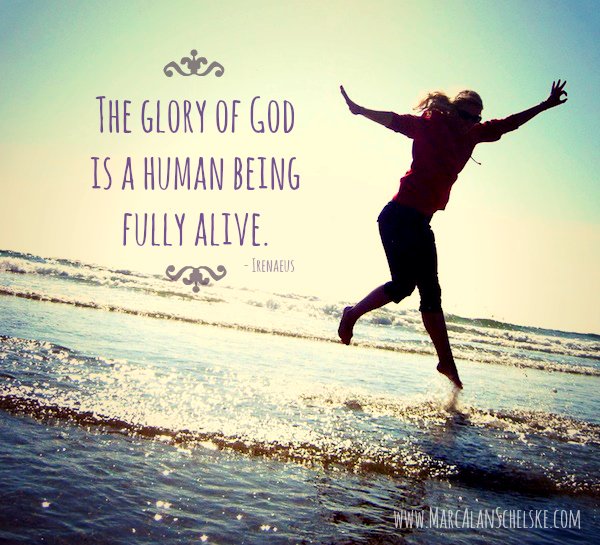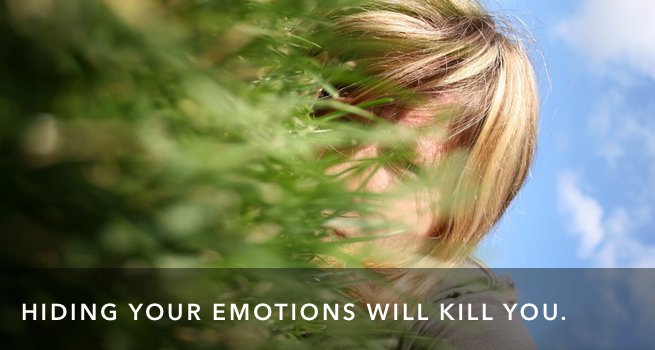Is Christianity killing you? It nearly killed me.
Faith is supposed to give life, abundant life. That’s what Jesus said. Instead this amazing community of faith that has so deeply shaped me, has often given just the opposite.
It’s happening because one of the implicit teachings of the modern church is this:
Don’t Feel.
There’s no room for feelings and faith to be together. Don’t feel because your feelings aren’t trust-worthy. Don’t feel because your feelings are temptations meant to lead you into sin. Don’t feel because that’s weak, and immature, and not at all like Jesus.
The problem with this mandate is that it’s not possible. We do feel. It’s how we were created. The more we try to keep our feelings and faith separate, the more we pretend, the more we live in denial, the more we avoid intimacy. The less we try to feel, the more we die bit by bit.
Stop feeling and die. Or feel and live.

I grew up in a fairly conservative, even fundamentalist, faith community. It was homey. It was safe. It was filled with nice people. But it was also a place where I learned that my emotions weren’t appreciated. In the most generous spirit, my emotions were considered immature distractions. But there were times when emotions were treated as the very influence of Satan.
Thomas Merton wrote that it often seems like our Christian beliefs have, “merely deadened our humanity, instead of setting it free to develop richly, in all its capacities, under the influence of grace.” That’s been my experience exactly. Maybe you’ve felt that too.
As a result, I grew up not treating my emotions very well.
- I learned to ignore them.
- I learned to pray them away or super-spiritualize them.
- I learned to suppress them and then feel guilty when they burst through my walls.
- I learned that emotional people were considered weak and immature, so I did what I thought made me look strong and mature.
Over the years the consequences have been a disaster. I struggle to build and maintain friendships. I had a hard time being authentic with my own emotions, and an even harder time expressing them to others. I still have a hard time with intimacy. My marriage, my closer friendships, my role as a leader in my church all bore the weight and damage of my emotional immaturity.
Christianity that doesn’t include your emotions will kill you. Tweet That.
A good therapist, building new friendships, lots of reading and journaling, doing the hard work of building new habits and taking emotional risks, prayer with words and painful wordless prayer in my gut are all a part of my recovery. It continues to be a long hard road back to who God made me to be, but this healing is happening.
Become more human and more spiritual.
Irenaeus, one of the early church Fathers, wrote, “The glory of God is a human being fully alive.” I had always thought that God got the most glory when I was good, or when I was doing ministry. Those things are certainly a part of the puzzle, but it’s so much more. As an artist, God’s glory is seen when His art is fully expressed. That means a life fully lived.
God created us in His image, even our emotions. God speaks to us through scripture. But God also speaks through our circumstances, through our reason, and through our emotions.
A faith that doesn’t help you incorporate and make sense of your emotions leaves you less than fully human. A faith that doesn’t help you learn how to listen for God in your emotions leaves you increasingly disconnected from the voice of God.

Peter Scazerro, a pastor who has spent a lot of time thinking about emotions and faith, wrote: “To feel is to be human. To minimize or deny what we feel is a distortion of what it means to be image bearers of our personal God. To the degree that we are unable to express our emotions, we remain impaired in our ability to love God, others, and ourselves well.”
Eugene Peterson, pastor, author and translator of The Message Bible said, “You don’t become more spiritual by becoming less human.” God’s design is that you would mature in the image of Christ. That means that you would grow up into the fullness of everything GOd created you to be. That includes whole and maturing emotions.
If like me, this is an area of life that needs attention, there are things you can do to start the shift.
- Consider this statement: “There is no spiritual growth without emotional growth.” Decide if you think that’s true, and then what it means for your life. (More on that here.)
- If you grew up in a religious home, take stock of what you learned about emotion in your early years. Consider how those early beliefs have effected your life. Here’s five things I learned early that I’ve had to deal with.
- Become aware of when your emotions change and why. Don’t just feel the feeling, inquire what it’s about.
- Begin journaling about your emotions, not just to vent, but to hear God in them. (More on that in a future post.)
As you become more aware of what’s happening within you, more steps will present themselves. I became aware of certain areas that I needed to learn more about, and set out to do that. I came across areas of my heart that I knew I needed outside help with, and that led me to find a good therapist. Unlearning old emotional habits takes a long time, but it’s worth it.
Your faith can be, in Merton’s words, something that sets you free to grow in all your capacities, under grace. Let me know how I can help.

I may be going far outside the text here, but for many years I’ve read John 10:10 as a promise of a comprehensively rich life – not always happy, not always safe or easy, but a life enriched and deepened by faith. A life in which we may cry harder, laugh longer, feel more disappointment and more triumph than otherwise. I’ve experienced more self-censoring of emotions than external dampening; regardless, it changes everything when we view our feelings as vital, necessary, and instructive,
Michael, I think you’re right on. That is the spirit of the Irenaeus quote as well. An abundant life is a life lived fully alive.
My own view is that the security of life in Christ allows me the safety to be able to own and experience the full range of my life, including the hard parts. Grace means I don’t have to perform anymore. In our culture this often means appearing strong or put together. Because my value is secure, I don’t have to earn or prove it. Because I’m not alone in the universe, I don’t have to live in fear. Because I believe there is something beyond this life that matters, I don’t have to live with a fundamental fear of failure or death.
Not saying my feelings live up to all of that. Just saying that these things create the possibility of me to feel all my negative emotions without being completely undone by them. I can feel terrible, or sad, or weak, or like a failure — and know that this is not my identity, or destiny. I guess I’m trying to say that even my terrible moments are cradled in grace.
“Cradled in grace” is a beautiful and excellent way of saying it.
Having grown up in the same system, I certainly know what you mean about emotions. Thank God He has shown us a better way! I knew I was changing fundamentally when I had a falling out with a friend, and instead of shoving the grief away, I leaned into it, tried to experience it to its full depth, acknowledged the struggle to others, and waited patiently for it to run its course. It was a very hard time since my son also got into some serious trouble right about then. He went to a troubled teen camp, and I sat at home with my journal, processing a double load of grief. I came out of that a more compassionate person, and with a far better relationship with my son. The relationship with my friend is somewhat repaired, but she is one of those people to forgive and yet treat with careful boundaries. Being a kinesthetic, feelings are super important to me. My father doesn’t understand that at all, and still tells me to step back from my emotions. I am grateful for my heavenly father who isn’t afraid of my emotions at all. I can yell and scream at Him if I need to, and He can handle it. I am also grateful for the reminder you gave here, that I need to not just feel my emotions, but look into why they are there, because so often just feeling them without understanding is indeed a trap that sends me into temptation and failure.
So well put, Cherise! I remember seeing this comment come across my phone, and then I forgot to reply in the press of the day. Thanks for sharing. I want to not be afraid of emotions too!